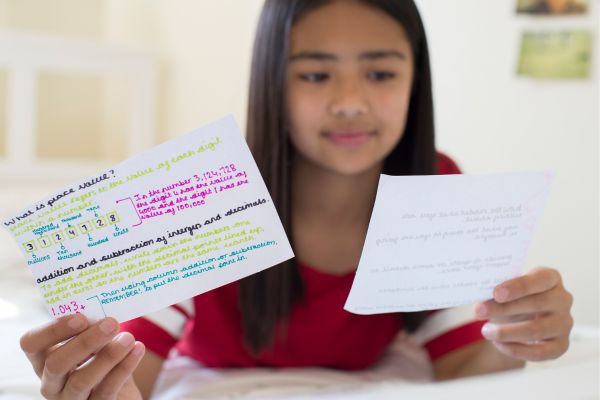
Supporting Children through Exam Stress: Tips for Parents
Exams can be a challenging time for both children and parents, often leading to ‘exam stress’ and anxiety. As a result, your child’s normal sleep pattern may be disrupted, they may feel ill, their appetite can be affected, and they may be anxious or have periods of low mood.

Teacher strikes in recent months have also meant that those children taking their SATs, GCSEs, and A-Levels have missed out on several days of teaching. A new poll by Ipsos Mori shows 60% of parents support teacher strikes, but about two in five are worried about their child’s exam results being affected.
Supporting our children as they prepare for their exams is more important than ever, and there are things we can do to help them deal with exam-related pressure.
It’s normal to feel nervous
Reassure your child that they are not the only one who will be worried, in fact, it’s a completely natural reaction. It may also be helpful to speak to your child’s school to find out if they have strategies in place to help children who are particularly struggling with stress, for example, mindfulness activities or revision classes.
Establish a positive mindset
Try and instill a positive mindset surrounding exams in general. Emphasise to your child that exams are not a measure of their worth, but an opportunity to showcase their knowledge and growth. Encourage them to set realistic goals and focus on personal progress rather than solely aiming for high grades. Reassure them that their efforts and hard work are valued, irrespective of the exam results they get.

Provide reassurance and avoid criticism
Create an environment where your child feels comfortable discussing their concerns and asking for guidance. Listen to them, acknowledge their feelings, and offer advice, checking in regularly to gauge their progress. Congratulate them on what they’ve done already and let them know that failing isn’t the end of the world. Remind them that it’s ok to make mistakes and that learning is a gradual process.
There’s no such thing as a silly question
It’s important that your child feels they have people they can go to for advice during this stressful time. Encourage them to ask their teachers for help if there is something they are struggling with – that’s what they are there for! Also, talking to classmates about any problems they may encounter is another channel of support they can utilise.

Provide a quiet and organised environment
Designate a quiet and clutter-free space for your child to study. A well-lit area away from distractions such as the television and excessive noise will help them to concentrate and take in information more easily.
Time management and study techniques
Help your child to break down complex topics into manageable chunks. Encourage them to prioritise tasks and set realistic goals. Effective time management skills help to prevent procrastination and last-minute panic. Having ample time to revise thoroughly will help your child to approach their exams with confidence.
Skip and go back
Remind your child that it’s not always helpful to spend too long on one question during an exam, especially one they are finding challenging to answer. If they move on to another they are more comfortable with, it will build their confidence and when they return to the question, they may find it easier to tackle.
Encourage healthy lifestyle habits
A healthy lifestyle plays a vital role in reducing stress and improving cognitive function. Make sure your child eats a healthy and balanced diet, drinks plenty of water, gets enough sleep, and exercises regularly. Adequate rest and nutrition will boost their energy levels, enhance concentration, and their general well-being. It is particularly important that your child has something to eat and drink before an exam, even if nerves are curbing their appetite, to keep them energised and focused.

Make sure they take time out
It is important for children to take a break from studying; it can be just as important as revising. Participating in sports, going for a walk, seeing friends, listening to calming music, or watching a feel-good film, will provide a healthy balance and help reduce stress.
And relax
Practising breathing and relaxation techniques, and taking part in activities such as yoga can help children to stay in the moment and self-regulate. Sensory toys such as stress balls can also be useful in the classroom or on the way to school to help children calm their nervous systems.
Most importantly, make sure your child knows that exams are not the be-all and end-all, and exam results certainly don’t represent everything that’s wonderful about them as a person!



